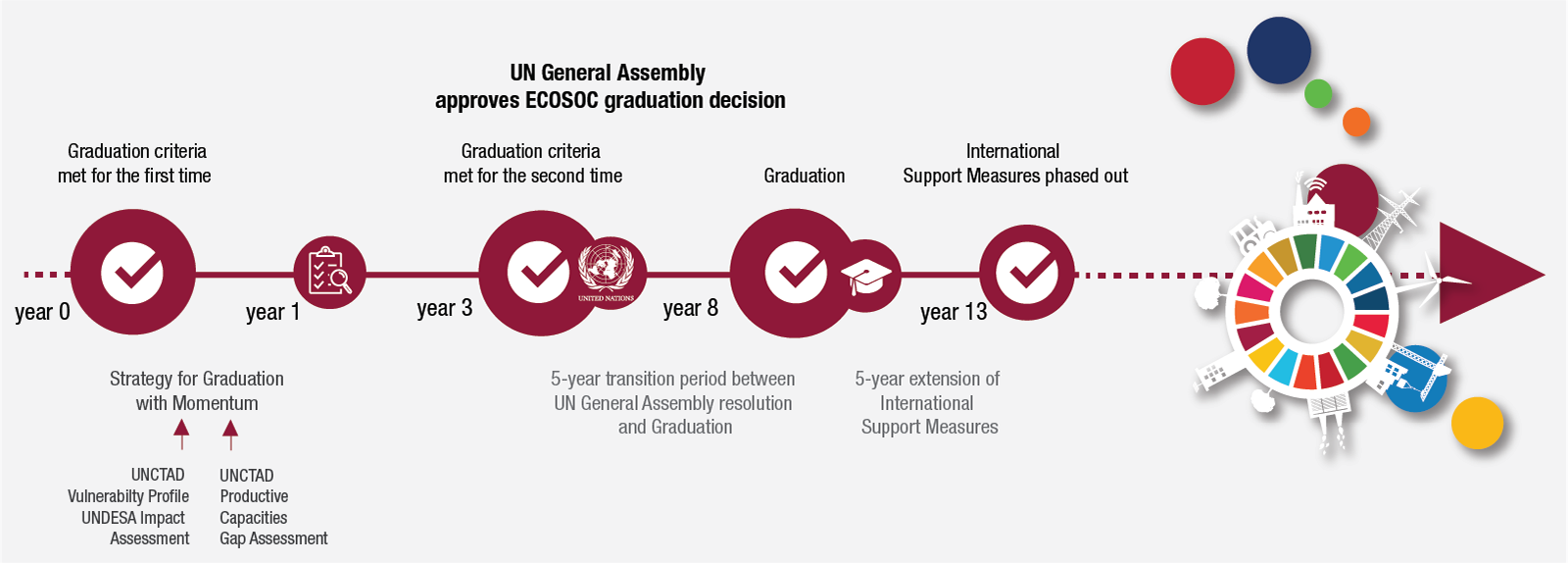UNCTAD is developing a “graduation with momentum strategy” for least developed countries that have met graduation criteria, based on building, maintaining, and using productive capacities.
This approach was documented in, Achieving graduation with momentum through the development of productive capacities.
UNCTAD maintains that a country’s development process continues indefinitely beyond graduation, and its subsequent success critically depends on the foundations it was able to build during graduation. How graduation is achieved is thus as important as when it is achieved.
The development path an LDC follows to achieve the eligibility criteria for graduation has important implications for the challenges and vulnerabilities they face after graduation, and the resources and means they have at their disposal to address them.
The key feature of “graduation with momentum” is to bridge the pre- and post-graduation development processes to create sustainable graduation and continuity in the development trajectory.
UNCTAD proposes two key adjustments to the current conceptualization of graduation strategies:
- The introduction of a policy framework to help refocus the objectives and strategic direction of the graduation strategy.
- A new timeframe for the implementation of the strategy.
Achieving this entails the design of long-term catch-up strategies for countries to build their capabilities and so they can keep pace with other developing countries (ODCs).


National workshops and dialogues

Following the 2021 Triennial Review of the list of Least Developed Countries by the UN Committee for Development Policy, UNCTAD held several virtual national workshops and dialogues with member States towards the formulation and implementation of a post-graduation strategy.
In November 2021, for example, a webinar on the Least Developed Countries Report 2021 in the context of Zambia’s graduation was held in collaboration with the UN Resident Coordinator’s Office. Zambia’s economy was hard hit by the COVID-19 crisis, which aggravated the foreign debt situation and eventually led to a debt default in November 2020.
It now needs to invest in the development of productive capacities to recover from the current slump, which should support economic diversification and the upgrading of the productive structure over the medium term.
Zambia also needs to design and implement a strategy for graduation with momentum in the run-up for its likely exit from the LDC category later in the present decade.
A similar workshop was held for Senegal in December 2021 to present the findings of the Least Developed Countries Report 2021 and its implications for Senegal. It focused on the LDC graduation process and aimed to pave the way for better preparedness to achieve graduation with momentum.
The workshop was jointly organized with the United Nations Resident Coordinator Office in Senegal and the Committee for Development Policy (CDP) Secretariat at the UN Department of Economic and Social Affairs.
Also in December 2021, UNCTAD shared its LDC report findings and their implications for the Comoros in a workshop to promote policy dialogue between national policymakers and UN System officials.
This is especially important in the context of the lingering impacts of the COVID-19 crisis, the country’s slow pace of development of productive capacities and the forthcoming start of the processes around the country’s graduation from the LDC category.
More on support to LDC graduation


